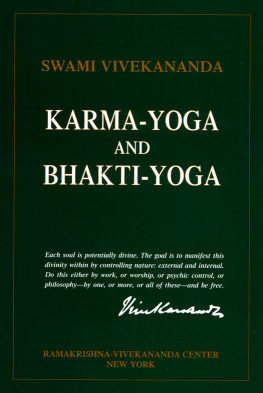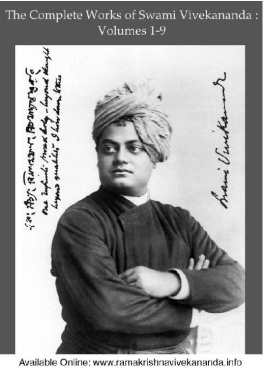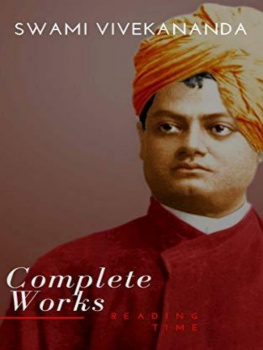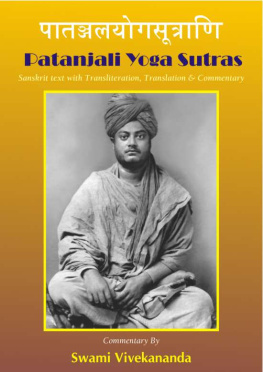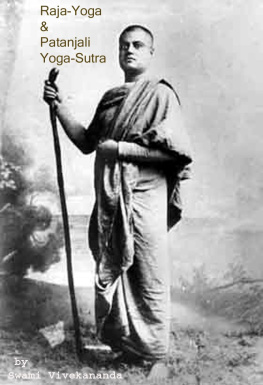KARMA-YOGA
AND
BHAKTI-YOGA
RAMAKRISHNA-VIVEKANANDA CENTER OF NEW YORK
17 East 94th Street, New York, N.Y. 10128
PUBLICATIONS
By Swami Nikhilananda
HINDUISM: Its Meaning for the Liberation of the Spirit
HOLY MOTHER: Being the Life of Sri Sarada Devi, Wife of Sri Ramakrishna and Helpmate in His Mission
MAN IN SEARCH OF IMMORTALITY: Testimonials from the Hindu Scriptures
VIVEKANANDA: A BIOGRAPHY
Translated by Swami Nikhilananda
THE BHAGAVAD GITA
THE BHAGAVAD GITA (Pocket Edition)
THE GOSPEL OF SRI RAMAKRISHNA
THE GOSPEL OF SRI RAMAKRISHNA (Abridged Edition)
SELF-KNOWLEDGE (Atmabodha)
THE UPANISHADS Volumes I, II, III, and IV
By Swami Vivekananda
INSPIRED TALKS, My Master and Other Writings
JNANA-YOGA
KARMA-YOGA AND BHAKTI-YOGA
RAJA-YOGA
VIVEKANANDA: THE YOGAS AND OTHER WORKS
(Chosen and with a Biography by Swami Nikhilananda)

VIVEKANANDA AT THE PARLIAMENT OF RELIGIONS
KARMA-YOGA
AND
BHAKTI-YOGA
by
SWAMI VIVEKANANDA
REVISED EDITION

RAMAKRISHNA-VIVEKANANDA CENTER
NEW YORK
KARMA-YOGA AND BHAKTI-YOGA
Copyright 1955 by Swami Nikhilananda
Trustee of the Estate of Swami Vivekananda
Printed in the United States of America
All rights in this book are reserved.
No part of the book may be used or reproduced in any manner whatsoever without written permission except in the case of brief quotations embodied in critical articles and reviews. For information address Ramakrishna-Vivekananda Center, 17 East 94th Street, New York, N.Y. 10028.
FIRST EDITION
(Four Printings)
SECOND EDITION
(Four Printings)
PAPERBACK EDITION 1982
(Three Printings)
ISBN 0-911206-22-1
Library of Congress Catalog Card Number: 55-8657
PREFACE
The present revised edition of Karma-Yoga and Bhakti-Yoga has been taken from Vivekananda: The Yogas and Other Works, published in 1953 by the Ramakrishna-Vivekananda Center of New York. The following lines quoted from my preface to the latter will explain the reasons for the editing of the book:
Swami Vivekanandas public life covered a period of ten yearsfrom 1893, when he appeared at the Parliament of Religions held in Chicago, to 1902, when he gave up his mortal body. These were years of great physical and mental strain as a result of extensive travels, adaptation to new environments, opposition from detractors both in his native land and abroad, incessant public lectures and private instruction, a heavy correspondence, and the organizing of the Ramakrishna Order in India. Hard work and ascetic practices undermined his health. The Swami thus had no time to revise his books, which either were dictated by him or consisted of lectures delivered without notes and taken down in shorthand or longhand. I have therefore felt the need of editing the present collection, making changes wherever they were absolutely necessary, but being always mindful to keep intact the Swamis basic thought.
Ninety pages of new material from the lectures of Swami Vivekananda have been added to the present volume in order to give the reader access to more of the Swamis teachings and also to make the present volume uniform with the other three books of the series.
NIKHILANANDA
Ramakrishna-Vivekananda Center
New York
February 21, 1955
CONTENTS
NOTE ON THE PRONUNCIATION OF SANSKRIT AND VERNACULAR WORDS
| a | has the sound of o in come. |
| a in far. |
| e | e in bed. |
| i | ee in feel. |
| o | o in note. |
| u | u in full. |
| ai, ay | oy in boy. |
| au | o pronounced deep in the throat. |
| ch | ch in church. |
 | hard d (in English). |
| g | g in god. |
| jn | hard gy (in English). |
| sh in shut. |
| th | t-h in boat-house. |
sh may be pronounced as in English,
t and d are soft as in French.
Other consonants appearing in the transliterations may be pronounced as in English.
Diacritical marks have generally not been used in proper names belonging to recent times or in modern and well-known geographical names.
UNIFORM WITH THIS EDITION
Rja-Yoga
Jnna-Yoga
KARMA-YOGA
KARMA AND ITS EFFECT ON CHARACTER
THE WORD karma is derived from the Sanskrit kri, to do. All action is karma. Technically this word also means the effects of actions. In connexion with metaphysics it sometimes means the effects of which our past actions were the causes. But in karma-yoga we have simply to do with the word karma as meaning work.
The goal of man is knowledge. That is the one great ideal placed before us by Eastern philosophy. Not pleasure, but knowledge, is the goal of man. Pleasure and happiness come to an end. It is a mistake to suppose that pleasure is the goal; the cause of all the miseries we have in the world is that men foolishly think pleasure to be the ideal to strive for. After a time a man finds that it is not happiness, but knowledge, towards which he is going, and that both pleasure and pain are great teachers, and that he learns as much from pain as from pleasure. As pleasure and pain pass before his soul, they leave upon it different pictures, and the result of these combined impressions is what is called a mans character. If you take the character of any man, it really is but the aggregate of tendencies, the sum total of the inclinations of his mind; you will find that misery and happiness are equal factors in the formation of that character. Happiness and misery have an equal share in moulding character, and in some instances misery is a better teacher than happiness. Were one to study the great characters the world has produced, I dare say it would be found, in the vast majority of cases, that misery taught them more than happiness, poverty taught them more than wealth, blows brought out their inner fire more than praise.
Now knowledge, again, is inherent in man. No knowledge comes from outside; it is all inside. What we say a man knows should, in strict psychological language, be what he discovers or unveils; what a man learns is really what he discovers by taking the cover off his own soul, which is a mine of infinite knowledge. We say that Newton discovered gravitation. Was it sitting anywhere in a corner waiting for him? It was in his own mind. The right time came and he found it out. All the knowledge that the world has ever received comes from the mind; the infinite library of the universe is in your own mind. The external world is simply the suggestion, the occasion, which sets you to studying your own mind; but the object of your study is always your own mind. The falling of an apple gave the suggestion to Newton, and he studied his own mind; he rearranged all the previous links of thought in his mind and discovered a new link among them, which we call the law of gravitation. It was not in the apple nor in anything in the centre of the earth. All knowledge, therefore, secular or spiritual, is in the human mind. In many cases it is not discovered, but remains covered. When the covering is being slowly taken off we say that we are learning, and the advance of knowledge is made by the advance of this process of uncovering. The man from whom this veil is being lifted is the knowing man; the man upon whom it lies thick is ignorant; and the man from whom it has entirely gone is all-knowing, omniscient. There have been omniscient men, and, I believe, there will be yet; there will be many of them in years to come.
Next page
